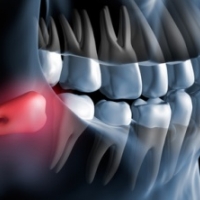Oral surgery
Dental surgery provides medical procedures: prevention, diagnosis, and treatment of diseases of the gums, teeth, jaws, and mouth.
Wisdom Tooth Extraction: What is Wisdom Tooth?
Wisdom tooth (also known as “third molars”) are usually the last teeth to develop between the ages of 17 and 25. If the wisdom tooth is unable to break through the gums is called "impacted" wisdom tooth. This happens because there is not enough place for the wisdom teeth to enter in the mouth.
Removal of wisdom-tooth - Why is it recommended to remove the wisdom teeth?
Teeth no. 8, which are evolutionary "remainder teeth", can cause a lot of problems:
- obstruction of teeth, because of the small teeth
- they can be cleaned with difficulty as it is not easy to reach them, therefore they decay easily
- they can get inflamed, can cause lock- jaw and cyst might form around them
- they lean against the previous teeth, therefore they can decay and their root might work off
- bridge can not be prepared, only in special cases
- difficult to reach them therefore difficult to fill them
- no root treatment can be done as they have 2-3-4 root channels
- unnecessary teeth as they do not have role in chewing
To sum it up, these teeth are causing problems in most of the cases: they can decay easily and got inflamed. Therefore we are recommending their removal. These operations are done in local anesthesia. Usually it can be sorted with a simple tooth extraction, in some cases operation is needed.
Tooth Extraction:
In many cases the teeth can be saved for example with root treatment or root resection even if the patient thought earlier that it was not possible. In such cases we recommend keeping the teeth. Teeth are removed only if they can not be saved.
When is it needed to remove the teeth?
if there are inflammations caused by teeth which are resulting in pain and there are no other possibilities (for example root treatment, root resection) for treatment; furthermore if the inflammation endangers the rest of the teeth
the inflammations is to intense that accumulation might be formed
broken, decayed tooth, which can not be restored, furthermore it can not be built up for implants
if the tissues of the teeth (ie, periodontitis) due to periodontal disease (commonly known as gingival) damaged to such an extent that the teeth would move dangerously
What to do after tooth extraction?
After teeth removal take one pain killer. In this way the direct pain after the intervention can be avoided. Probably no further pain killers will be needed.
After teeth extraction you should not rinse or spit. Otherwise bleeding might start after the haematoma falls from the wound
Do not eat until you feel the effect of the anesthetic! Otherwise you can cause sever injuries to yourself.
You can drink but the common belief saying spirit disinfect is wrong, furthermore it can be dangerous; it can inspire bleeding.
After tooth extraction pay special attention to your mouth hygiene. If it is feasible, you have to brush your teeth, more often. Mouth disinfecting liquids might help (of course not right after the extraction).
If the tooth was inflamed it might happen that you get fever. In such cases use the normal antifebriles.
 English
English  German
German Hungarian
Hungarian
